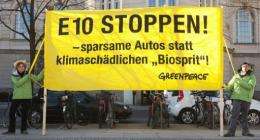Germany sticks with troubled 'biofuel'

The German government said after crisis talks on Tuesday it was sticking with a newly introduced petrol with a 10-percent biofuel content despite major problems since its introduction last month.
"We need to reduce our dependency on oil," Environment Minister Norbert Roettgen said after meeting automakers, oil company representatives and consumer and motorists' organisations in Berlin.
"All those involved in the meeting are in favour of E10 (fuel) in order to protect the climate, to safeguard the environment, to preserve natural resources and for greater energy security."
The new fuel, which went on sale in February at German petrol stations, is to comply with a European Union directive for biofuels to account for at least 10% of all petrol and diesel sold in the 27-nation bloc by 2020.
In France, the launch has gone smoothly, with E10 accounting for 13% of all petrol sales at the end of 2010 and the fuel is available in close to 20 percent of filling stations.
But German motorists have steered clear, despite the fact that it is cheaper than regular petrol, because of fears that it will damage their engines even though the automobile federation says 93 percent of cars can use it.
There are also doubts about its environmental benefits because considerable amounts of carbon dioxide are emitted during the harvesting and processing of the crops, and because the fuel is less efficient, critics say.
Strong demand for the fuel also means less farmland is available for other crops, pushing already rising food prices -- and therefore inflation -- even higher around the world.
Sigmar Gabriel, head of the opposition Social Democrats (SPD) and Roettgen's predecessor, said that instead of biofuels the government "should focus on promoting electric and hydrogen-powered cars."
Roettgen said that automakers had agreed to provide legally binding information on which cars can use the fuel that will be clearly displayed at petrol stations and made available at garages.
"Around a year ago we were all witnesses on the television to the oil catastrophe in the Gulf of Mexico, with enormous damage to the environment," Roettgen said.
"Every day we see (Libyan leader) Moamer Kadhafi persecuting and bombarding his own people. Do we want to keep buying oil in order to finance states and regimes like this?"
(c) 2011 AFP

















